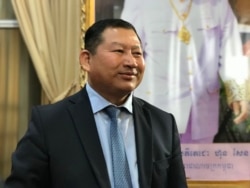A Commerce Ministry official said on Thursday that initiation of talks with China for a free trade agreement were not linked to a potential suspension of the ‘Everything But Arms’ trade scheme.
The Chinese Embassy in Phnom Penh announced last week that the two countries would meet in Beijing in December to initiate consultations on a feasibility study, which could precede trade deal talks.
Pen Sovicheat, Undersecretary of State at the Commerce Ministry, said trade talks with China and potential revocation of the EBA scheme were unrelated, and an FTA with China was not designed to be a fallback.
Cambodia faces potential suspension of the EBA scheme and is currently under investigation from the EU Commission for its human rights record. A Radio Free Asia report last week showed that the economic bloc remained concerned and unsatisfied with the government’s attempts to rollback its crackdown on the political opposition, NGOs and independent media organizations.
“We should not think that we have a problem on this [EBA] issue or that we are preparing to establish [an FTA with China] as a solution to deal with the loss of EBA,” Pen Sovicheat said, during a press conference at the Council of Ministers. “It is just a coincidence.”
He also warned against assuming that the EU would suspend the trade scheme because the government would put forth strong arguments to counter the economic bloc’s concerns. After submitting its preliminary report to Cambodia on November 12, the government has one month to officially send a response.
Speaking at the Royal Academy of Cambodia, Prime Minister Hun Sen also asked his officials to take advantage of the existing China-ASEAN trade deal, but did not refer to a potential FTA with China.
“The potential we have is immense but we seem to overlook it because we focus too much on looking far than seeing what’s near [us],” he said, referring to Western and regional markets, respectively.
An FTA with China would be Cambodia’s first bilateral trade agreement with a foreign country, and the negotiations would occur amid the backdrop of growing Chinese influence and investments in the construction, real estate, and tourism markets.
Bilateral trade with China stood at $7 billion in 2018, with Cambodia facing a trade deficit on account of $6.1 billion in imports from China, according to Commerce Ministry figures. In contrast, trade with the EU was pegged at $6.7 billion last year, $6 billion of which were Cambodian exports to the economic bloc.
While, China has shown willingness to increase its purchase of agricultural products from Cambodia, such as rice and cassava, it is unlikely to import garments or footwear that will help compensate for a potential drop in trade with the EU.
Sebastian Strangio, an observer of Chinese influence in the region, said it was hard to concretely link the FTA talks with possible loss of the EBA agreement. But, he said, it was clear Cambodia was looking to move away from its reliance on Western markets.
“It's clear that the Cambodian government is doing what it can to reduce its economic reliance on Western nations and diversify its exports. Signing an FTA with China would certainly fit into that,” Strangio told VOA Khmer in an email.





